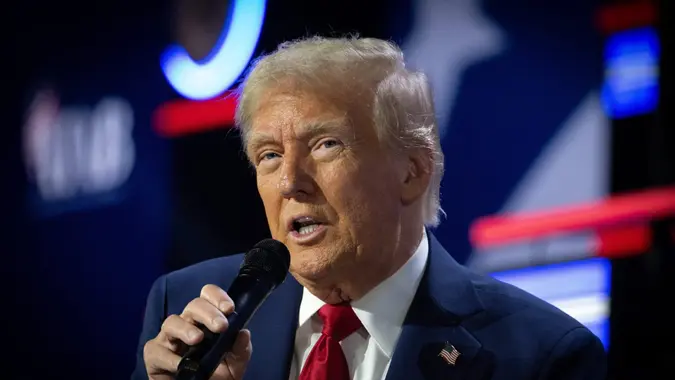How Donald Trump Could Change the EV Tax Credit, According to Car Expert Doug DeMuro

Commitment to Our Readers
GOBankingRates' editorial team is committed to bringing you unbiased reviews and information. We use data-driven methodologies to evaluate financial products and services - our reviews and ratings are not influenced by advertisers. You can read more about our editorial guidelines and our products and services review methodology.

20 Years
Helping You Live Richer

Reviewed
by Experts

Trusted by
Millions of Readers
Doug DeMuro is a San Diego, California-based automotive columnist, author, internet entrepreneur and influencer. His YouTube channel boasts 4.88 million subscribers. On a recent episode of “This Car Pod!” DeMuro and his guests discussed how President-elect Donald Trump’s second term in office could impact the automotive industry.
How President-Elect Trump’s Win Could Impact Grocery Prices
Those on the podcast concluded that “there’s not a clear-cut answer” but that most changes will likely come from Trump’s initiatives regarding electric vehicle (EV) tax credits and tariffs on imports.
Also see two possible changes coming to American car prices in the next four years under Trump.
Tariffs Could Increase the Price of Imported Cars
DeMuro and his guests started with Trump’s vow to institute a universal tariff of up to 20% on all goods coming into the U.S. and a 25% tax on imports from Mexico and Canada.
“A lot of cars that are sold in the U.S. are built in Mexico,” DeMuro’s guest said. “The implication would be that will raise the cost of cars sold in the U.S. by a fair amount. Honda, for example, builds hundreds of thousands of cars in Mexico. Ford does as well.”
And it’s not just foreign automakers that would likely take a hit from 25% tariffs on America’s former NAFTA partners. Detroit could feel the squeeze too.
According to Reuters, GM exports more cars from Mexico to America than any other automaker. It will import 750,000 vehicles from south of the border this year, including nearly 390,000 midsize SUVs and 370,000 Chevy Silverado or GMC Sierra pickups. The top 10 car manufacturers with plants in Mexico built 1.4 million vehicles over the first six months of 2024, 90% of which were sold to U.S. buyers across the border.
It’s not just the cars themselves. Tariffs could impact the entire industry’s supply chain. For example, according to Automotive Logistics, some components cross the U.S.-Mexico border multiple times before they’re installed in a vehicle.
EV Tax Credits Are in Trump’s Crosshairs
The more immediate and consequential impact a second Trump term could have on U.S. car buyers would affect anyone considering going electric.
“More important than the tariffs, the electric vehicle incentives will change,” DeMuro said.
Currently, buyers can shave $7,500 off the price of a new EV, plug-in hybrid or fuel-cell vehicle and up to $4,000 for a used model, with restrictions including income limits and the vehicle’s country of origin.
According to Reuters, Trump’s transition team is strategizing to kill the credits as a top priority.
“I do have a sense that EVs may not be as heavily incentivized going forward,” DeMuro said.
A Repeal Would Require Congressional Action
Per The New York Times, Elon Musk, the man who contributed more to the rise of electric cars than any other individual, also wants to see the $7,500 EV credit meet its demise, with the Times reporting that Musk predicts repealing the credit would hurt legacy automakers like GM and Ford.
But no matter the perspective of the incoming administration, Trump can’t repeal the tax credits unilaterally — with or without Musk’s deep pockets.
According to the Times, President Biden’s 2022 Inflation Reduction Act established the credits. Therefore, Congress would have to amend the law or pass a new one to eliminate them.
Trump could, however, make it harder for consumers to access the credits and issue new guidance that eliminates the credits for leased vehicles. He could also cause confusion by changing or taking down government websites that explain the credits while waiting for Congress to act, per The New York Times.
EV Buyers Could Have Fewer Non-Tesla Options
According to CBS News, Tesla is the only U.S. automaker turning a profit on EVs. Competitors like Ford and GM sell a fraction of the EVs, and they do it at a loss. The New York Times reported that legacy automakers rely heavily on tax credits to incentivize buyers and Tesla does not. Some of its vehicles don’t even qualify for the credits, and its enormous advantage in infrastructure and marketing — such as charging stations, production facilities and branding — has given Tesla greater market appeal.
The demise of the credits could force Detroit to scale back or eliminate its EV initiatives, benefiting Tesla, per CBS News.
But it remains to be seen what Trump will end up doing regarding EV initiatives. And DeMuro thinks the changes may not be as drastic as some expect. “Trump talks a big game in a lot of ways, but he’s got a fairly broad coalition and can’t go too far in any one direction. As worried as people get, I think that this is a good example of an area where he can’t go too crazy,” DeMuro concluded.
Editor’s note on political coverage: GOBankingRates is nonpartisan and strives to cover all aspects of the economy objectively and present balanced reports on politically focused finance stories. You can find more coverage of this topic on GOBankingRates.com.
 Written by
Written by  Edited by
Edited by 

























